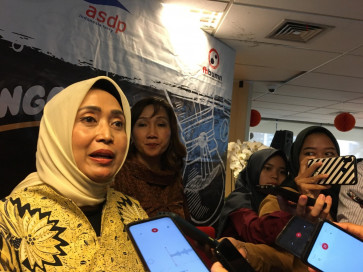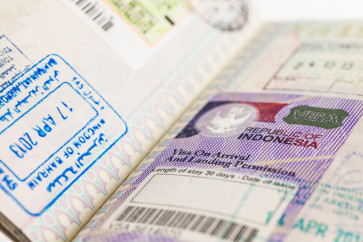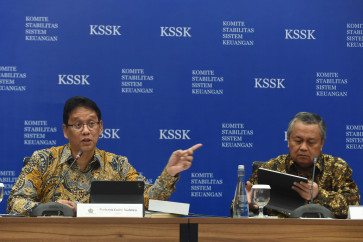Popular Reads
Top Results
Can't find what you're looking for?
View all search resultsPopular Reads
Top Results
Can't find what you're looking for?
View all search resultsChildren seize the day by switching off the TV
For many children, Sunday morning is monopolized by cartoons on TV
Change text size
Gift Premium Articles
to Anyone
For many children, Sunday morning is monopolized by cartoons on TV.
Not this Sunday though, when more than a hundred kindergarten students preferred to skip their favorite programs in favor of outdoor activities in support of “No TV Day”, which was celebrated at the National Monument (Monas) in Central Jakarta.
“No TV Day” was also held with the mood of National Children’s Day, falling last Thursday, still in the air.
Watching a puppet show, participating in a drawing and coloring competition and working on puzzles were some of the activities held at Monas.
In one corner, several children, helped by their parents, took turns to roll an extra-large dice and move step-by-step on a giant snakes-and-ladders game board.
“Yeah! I made it,” a little girl shouted after making her first stop on the board’s final square. Nearby parents could not hide their smiles after seeing the girl’s beaming expression.
B. Guntarto, head of the Children’s Media Development Foundation (YPMA) and chairman of the coalition’s steering committee, said the campaign was triggered by media activists’ concern about the negative influence of inappropriate content in TV programs aimed at children.
“Children are like sponges. They easily absorb and copy what they see, including what they see on TV,” he said.
“Unfortunately, many TV programs air inappropriate content, that is sexual or violent.
“So, it is important for parents to provide guidelines for their children while watching TV programs,” Guntarto said.
According to YPMA’s 2006 study, Indonesian children in cities watched more than four hours of TV a day, two times higher than the recommended two hours.
The figure also means that most children spend 1,500 hours a year watching TV, more than they spend studying at school, which adds up to 750 hours per year.
The situation is worsened by the presentation of inappropriate infotainment, reality shows and soap operas (sinetron) during the hours children watch television.
In June, the foundation recorded that of 67 television programs aired on all eleven TV stations per week, more than 50 percent had a considerable amount of sexual and violent content.
Hendriani, a lecturer at the University of Indonesia’s communication department, emphasized that parents must select safe programs for their children.
“Even if they are working, they should pass on the duty [of selecting safe TV programs] to their maids or any other adults in the house,” she said.
She also urged parents to encourage their children to participate in more outdoor activities.
“Activities like gardening, having a picnic or playing sport, will actually help children have alternative leisure time. To some extent, it would also enhance the relationship between parents and their children,” she said.
Ali, 31, who accompanied his 5-year-old son to the event, voiced concern over the excessively violent and sexual content of TV programs.
A resident of Tambun, Bekasi, Ali said he and his wife always tried to monitor what their son watched on TV.
“As I work from morning to evening on weekdays, Ramdhan always watches children’s programs with his mother. One of his favorite films is Spongebob,” Ali referred to a popular cartoon character.
“On weekends, it is my turn to spend time and hang out with him,” he said. (hwa)










